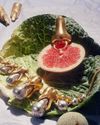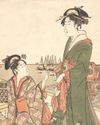
The scene is a park in the late afternoon. It is springtime: The trees are a profound, almost bluish emerald; the first reeds are beginning to sprout in the river. The sky is a soft, worn, denimy blue, although above a smudge of cloud is a stripe of near black — it will rain soon. Yet there is no sense of doom, no portent; the rain, you sense, will be welcome when it arrives.
Down by the river, people have gathered. The adults wear kimonos in shades that match the landscape — rich greens, warm blues — and the children wear clothes the colour of carp. A little girl turns her face up to her mother; a little boy bends over to peer at something he spots in the grass — his mother reaches out her arms to him in the universal helpless gesture of a parent trying to call back her child from the brink of mischiefmaking even as she understands her attempts will be futile. In the hills above them are two pavilions connected by a wooden bridge and accessed by a steep staircase that wends through the forest; in the windows, some of whose shoji shades have been pushed back to allow the air in, you can see that the ceiling has been strung with globes of red paper lanterns.
But all of these details, all of this life, is incidental to the element that dominates this tableau: a grove of cherry trees, most of them in full flower. Behind the cluster of 16 that stands closest to the river, there is another layer, this one so profuse in its bloom that it has become a cloud of pink, the petals so thickly clumped that they obscure even the surrounding greenery — the pines and paulownias and persimmon trees, now bare of fruit — in a fog. Beneath the trees, on wide, low benches made of young bamboo, sit people, singly or in couples. Two women turn to each other in conversation, but the remainder do not; they are not there to do anything — they are only there to sit beneath the cherry trees.
This story is from the {{IssueName}} edition of {{MagazineName}}.
Start your 7-day Magzter GOLD free trial to access thousands of curated premium stories, and 9,000+ magazines and newspapers.
Already a subscriber ? Sign In
This story is from the {{IssueName}} edition of {{MagazineName}}.
Start your 7-day Magzter GOLD free trial to access thousands of curated premium stories, and 9,000+ magazines and newspapers.
Already a subscriber? Sign In

Look At Us
As public memorials face a public reckoning, there’s still too little thought paid to how women are represented — as bodies and as selves.

Two New Jewellery Collections Find Their Inspiration In The Human Anatomy
Two new jewellery collections find their inspiration in the human anatomy.

She For She
We speak to three women in Singapore who are trying to improve the lives of women — and all other gender identities — through their work.
Over The Rainbow
How the bright colours and lively prints created by illustrator Donald Robertson brought the latest Weekend Max Mara Flutterflies capsule collection to life.

What Is Love?
The artist Hank Willis Thomas discusses his partnership with the Japanese fashion label Sacai and the idea of fashion in the context of the art world.

The Luxury Hotel For New Mums
Singapore’s first luxury confinement facility, Kai Suites, aims to provide much more than plush beds and 24-hour infant care: It wants to help mothers with their mental and emotional wellbeing as well.

Who Gets To Eat?
As recent food movements have focused on buying local or organic, a deeper and different conversation is happening among America’s food activists: one that demands not just better meals for everyone but a dismantling of the structures that have failed to nourish us all along.

Reimagining The Future Of Fashion
What do women want from their clothes and accessories, and does luxury still have a place in this post-pandemic era? The iconic designer Alber Elbaz thinks he has the answers with his new label, AZ Factory.

A Holiday At Home
Once seen as the less exciting alternative to an exotic destination holiday, the staycation takes on new importance.
All Dressed Up, Nowhere To Go
Chinese supermodel He Sui talks about the unseen pressures of being an international star, being a trailblazer for East Asian models in the fashion world, and why, at the end of the day, she is content with being known as just a regular girl from Wenzhou.